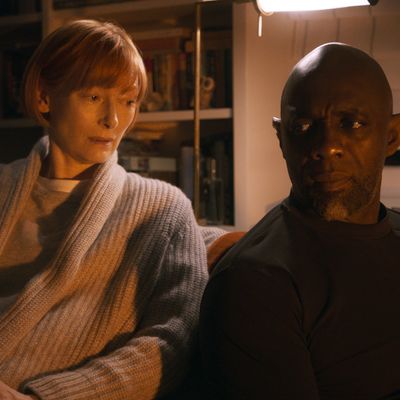
George Miller will forever be known (rightly so) as the Mad Max guy, but he has also been, for much of his career, one of our great fabulists. Even when he made a film based on a true story (1993’s Lorenzo’s Oil, a masterpiece), he did so with a kind of operatic flamboyance generally reserved for melodrama and myth. His latest, Three Thousand Years of Longing, is not based on fact — it’s been adapted, with quite a few liberties, from A.S. Byatt’s 1994 novella The Djinn in the Nightingale’s Eye — but it does start with the following assertion: “My story is true. You’re more likely to believe me, however, if I tell it as a fairy tale.” That sentiment could apply to any of Miller’s films.
Much like the Thousand and One Nights tales that clearly inspired it, Three Thousand Years of Longing features one narrator setting the stage for another narrator. The first voice we hear belongs to Alithea Binnie (Tilda Swinton), an internationally renowned narratologist who, during an academic conference in Istanbul, purchases a blown-glass bottle at the city’s famed Covered Bazaar and unleashes a Djinn (Idris Elba) who has been trapped inside it. The Djinn, who must grant Alithea three wishes so that he can be released from captivity for good, then relates to her his own ornate journey: It starts with his love for the Queen of Sheba (Aamito Lagum) and his sorrow at seeing her fall for the erotic wiles of King Solomon (Nicolas Mouawad), then moves on to the Ottoman court of Suleiman the Magnificent (Lachy Hulme), the brutal reign of Murad IV (Oğulcan Arman Uslu), the interregnum of Ibrahim the Mad (Jack Braddy), and, finally, to the harem of an elderly Turkish merchant in the 19th century, where the Djinn falls for the old man’s brilliant, ambitious, and frustrated young wife, Zefir (Burcu Gölgedar), after granting her the wish of total knowledge.
His story is romantic, and ironic, and fantastic, so Miller leans into the exoticism of the setting and the subject, as well as the winding cadences of the Thousand and One Nights, where a tale might start by leaping centuries and geographies before landing some place specific. It’s a particular, world-traversing rhythm that anyone brought up on such stories will immediately recognize. It enhances both the sense of wonder and the element of surprise, but it also adds a metaphorical kick to a given fable — suggesting that its lessons, such as they are, transcend borders and years. What those long-ago storytellers did with words, Miller does with images, his camera glancing across epic vistas like a rock skipping across a pond.
But for all the byzantine (heh) turns of the film’s narrative, if you had to distill this story to its fable-like essence, you might simply say it’s the tale of a Djinn who grants three wishes to a woman who refuses to ask for anything. Alithea initially resists the Djinn’s entreaties, correctly pointing out that stories about wishes coming true usually turn out to be cautionary tales. As we learn, however, she’s also resisting his offer because she wants to avoid opening herself up to any kind of want, which in turn would open her up to hurt. To ask for something is to acknowledge a desire, and Alithea has already lost quite a bit on that front. Of course, the Djinn’s own millennia-spanning tales of longing — for love, for knowledge, for independence — begin to inspire her yearning as well.
As the Djinn, Elba has a captivating melancholy that speaks to the fact that he has seen and felt so much; he’s loved and been loved, and he’s betrayed and been betrayed. Contrary to the one-note, “Your wish is my command!” hocus-pocus of other genie-types we’ve seen onscreen, this character actually has an inner life, even if he still retains a sense of mystery. In fact, the film is as much his story as it is hers. Perhaps even more his than hers. Alithea initially doesn’t have all that much to do except listen. But Swinton’s expressionistic face can compellingly convey the most elaborate emotional journeys. An intellectual eager to untangle and compartmentalize everything, her character starts off as cynical and superior, but gradually becomes more vulnerable and open. She begins, in other words, to want.
And that, naturally, comes with its perils for both of them. In its final act, Miller’s film moves to England and transforms into something quite striking. The Djinn wanders today’s world, observing the scientific marvels of modern life, which in his telling gain their own fantastical aura, and begins to mull the idea that this world might not have room for beings like himself. Meanwhile, granting Alithea her wishes might well be corroding his existence.
It is at this point that we may realize, if we haven’t already, that all the film’s tales have turned on images of captivity — from the Djinn’s imprisonment in the bottle, to the Ottoman sultans and their infamous golden cages, to the physical confinements of a forced, loveless marriage. Concurrent to all that, a spiritual and emotional entrapment runs through the picture as well — from the sweet hypnosis of a story that seems to have no end, to the idea of a love that cannot be given freely. Three Thousand Years of Longing is indeed a cautionary tale, but it’s a complex, beautiful one, suggesting that love, longing, and loss are all parts of a vast, wondrous life.


